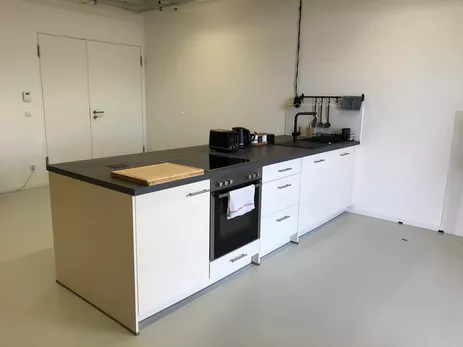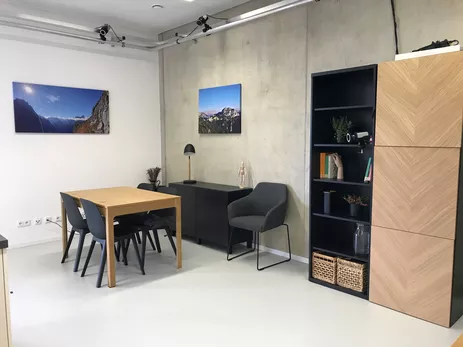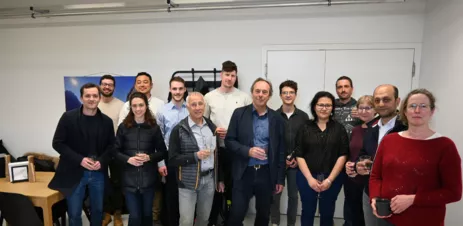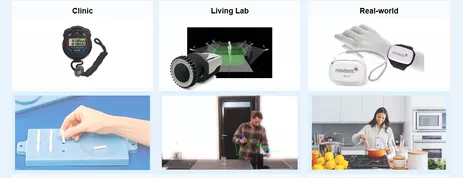Neurorehabilitation & Prevention
Research on prevention and rehabilitation of neurological diseases such as stroke, infantile cerebral palsy, multiple sclerosis, Parkinson‘s disease and dementia as well as research on healthy ageing. Main topics encompass fine motor control, daily activities and postural control. Apart from generic methods we employ new technologies such as accelerometry and augmented reality.
eXprt: Exoskeleton and Wearables Enhanced Prevention and Treatment
Paula Villa Fulton
Project title: eXprt - Exoskeleton and Wearables Enhanced Prevention and Treatment
Funding period: May 2022 - April 2026
Project website: https://web.tum.de/en/inw/our-innovation-networks/exprt/
For more information about TUM Innovation Networks, see https://web.tum.de/en/inw/home/
Motivation
The Innovation Network eXprt, consisting of nine chairs at TUM and seven associated researchers, has formed a multidisciplinary team merging engineering, neuroscience, and clinical neurology expertise to analyze and compare behavior in clinical test with controlled lab as well as uncontrolled free-world conditions. To this aim, a living lab was installed and wearable technologies are created. This collaborative effort aims to develop tools for the sensitive detection of sensorimotor and cognitive impairments in daily life and assess the impact of exoskeleton use on everyday activities. Over the project's 4-year duration, the International Graduate School of Science and Engineering (IGSSE) closely monitors the progress of Innovation Networks.
Our research focus
Existing methods for evaluating human performance when evaluating recovery or utilizing assistive technologies, such as exoskeletons, virtual reality, and exergaming applications, predominantly rely on general performance indicators like task completion, accuracy and elapsed time. Essentially, it is not solely a matter of whether tasks can be accomplished but equally vital to consider how they are executed. For individuals with disabilities, task completion directly influences their independence and everyday life, making it indispensable. Nonetheless, understanding the intricacies of task execution can play a pivotal role in achieving enduring rehabilitation benefitsThe Chair of Human Movement Science makes efforts to develop method of movement analysis and to employ wearable sensors for assessing the consequences of brain damage and evaluating the impact of exoskeleton training on daily life behavior. Our approach is centered on evaluating the effects of rehabilitation by employing metrics for movement smoothness, quality, and complexity and more. This approach not only aims to provide users with valuable insights into their rehabilitation progress but also seeks to inform the design of assisting devices such as exoskeletons to enhance their role in rehabilitation. Since wearable data from real world behavior is highly variable, we conduct more controlled measurements of daily life activities in the environment of a living lab (see Fig.).
Our objectives encompass the development of diagnostic tools capable of shedding light on movement quality during everyday activities, as well as the assessment of sensorimotor and cognitive performance in daily life. Furthermore, we endeavor to identify distinctive features indicative of specific impairments or changes in mobility and function. Additionally, we are dedicated to enhancing data integration and visualization to ensure that wearable sensor data becomes more actionable for both patients and clinicians. Ultimately, our goal is to offer a clearer understanding of how therapeutic interventions affect daily life activities and contribute to individual rehabilitation.
Mixed Reality
Nina Rohrbach
We are interested in the use of "Augmented Reality" and "Virtual Reality" for the study of motor learning principles, the preventive and rehabilitative use of commercially available systems, and the development of new assistive systems. We collaborate with internal and external partners. We are particularly interested in working with game developers and designers! If you are interested in joining the laboratory, please contact us.
Augmented reality (AR), i.e. the projection of virtual objects (holograms) into the natural field of view, enables researches to follow a new approach in neurorehabilitation. This applies to the assessment as well as training and the support of nursing and care services. The advantages of AR are, besides reliability, the mobility of the devices and their ecological validity. For the patient, AR offers a natural user interface with speech and gesture recognition. At the chair of human movement science, researchers do pioneer work, using a Microsoft HoloLens. In the “Therapy Lens” project (www.therapylens.com) first steps in assessing, training and assisting activities of daily living in dementia patients were done.
The use of Virtual Reality (VR) for motor rehabilitation is the subject of intensive research worldwide. Benefits for motor skills research are based on the possibilities of integrating motor learning principles (e.g., feedback, repetition, motivation). Please contact us if you are interested in working on projects using the latest systems (HTC Vive Pro). Students with diverse backgrounds are welcome, in particular electrical, computer, or mechanical engineering, game design, computer and information sciences.
Literature:
Rohrbach, N., Hermsdörfer, J., Huber, L-M, Thierfelder, A., Buckingham, G. (2021); Rohrbach, N., Gulde, P., Armstrong, A. R., Hartig, L., Abdelrazeq, A., Schröder, S., ... & Hermsdörfer, J. (2019); Rohrbach, N., Chicklis, E., & Levac, D. E. (2019).

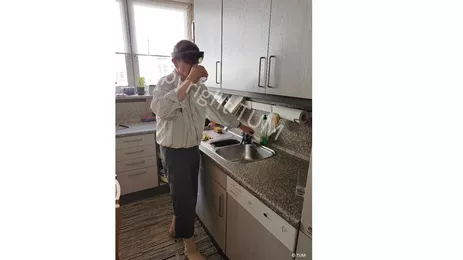
MobilE-Phy
Melanie Krüger & Joachim Hermsdörfer
The Chair of Human Movement Science is collaborating in the BMBF-funded joint project: “Munich network for healthcare research – MobilE-Net”. In particular, we contribute in the sub-project MobilE-PHY, which aims at assessing the effectiveness of an integration of physiotherapeutic interventions into primary care pathways for the increase in mobility and participation of patients with vertigo and balance disorders. In this context, we provide our scientific expertise in the acquisition, analysis and interpretation of everyday physical activity data, recorded through activity sensors worn during the intervention period.
Funding period: September 2018 – February 2020
Links: https://www.mobile-net.med.uni-muenchen.de/index.html
